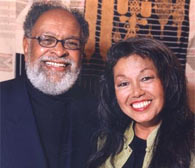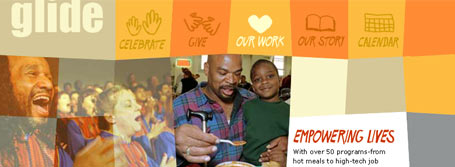Last Sunday, I attended a Methodist church service. Not the gay Metropolitan Community Church in Castro, mind you, but a bona fide Methodist joint in the Tenderloin. Other than a wonderful service at the Free Community Church in Singapore half a year ago, it was the first time I had attended church for a long, long while. Had been so disgusted with how "Christians" pervert Jesus' message of love and acceptance that I simply switched myself off to the whole phenomena of organised Christianity, or modern day Pharisee-ism, as I would prefer to think of it.
However, my friend, a dear old Jewish woman in her 70s, assured me that it was no ordinary church. She is such a sweet old gal and the last person I would ever suspect of trying to convert me to the straight (read: heterosexist) and narrow (read: tight ass :-o). Besides, she said the service should more appropriately be called a Sunday morning Jazz cabaret and I would have a ball. So I said yes, thinking: here's a gay man being hoodwinked into church by a Jewish woman, but what the heck, I'm in San Francisco so let's get with the spirit.
And she was damn right. Throughout the service, the whole congregation kept getting on their feet to clap and dance while the jazz band and divas belt it out on stage. But I am getting ahead of myself. The first order of service was baptism, the black pastor announced, while asking the parents to bring their children on stage. Two women came on stage holding their babies. How strange, I thought, usually the fathers would come up as well. And then it dawned on me. They were a lesbian couple! I whispered excitedly to my friend, who gave me a puzzled look that says: What? Haven't you seen one before?
The one-year-old boy smiled at the crowd when the pastor carried him and we all beamed back at him and applauded enthusiastically. The two-and-a-half-year-old girl cried when the pastor came towards her and kept shaking her head when he tried to press his wet fingers onto her forehead. And we laughed and applauded loudly too. After the baptism, the pastor spoke about family values, love and support, and asked all the parents in the congregation with babies to stand. Suddenly, the lesbian family, the single parent family, the heterosexual couple with kids, the inter-racial family, etc., all became visible at the same time. And the whole congregation applauded again to acknowledge all of them. Never did I ever think that one day, I would voluntarily stand up in a Methodist church applauding a pastor who talks about family values. How different it is to hear about family values spoke with love, than when it is cynically used with hatred and prejudice secretly brewing in the heart.
And then another African-American Minister came on to introduce his wife, a Japanese-American woman, who told us about the central values of the church: loving all the wonderful diversity of God's creation. Everyone is welcomed here: Buddhist, Hindus, atheist, gay, straight, white, black, rich, poorģ She waved proudly to her blond grandson in the congregation. I said hello to her after the service but deliberately neglected to ask about the genealogy from an African grandfather and Japanese grandmother to a Caucasian-looking grandson. It would be silly to mark that as strange in anyway because it summed up so well what this place was all about.
While the offering bag was passed around, a man from the choir stepped up to tell us about how homophobia used to make him feel ashamed, lacking and not good enough. But straight people are faced with something very similar as well, he said. They are bombarded by the ubiquitous advertisement insinuating that if they don't keep up with the Jones and own the latest model of this or the newest edition of that, then they are also lacking and not good enough and should feel ashamed. Love, he said, is not about making people feel ashamed and guilty. It is about embracing everyone as God's children. We must all live out fully who we are, not cower in fear that we do not fit any man-made image of what we ought to be. Amen, Shalom, Sha' Allah, Right on, Namaste.
At the end of the service, we all held hands and vigorously sang at the top of our lungs the civil rights movement's song: "We shall overcome." Damn, this is cool.

Over the years, Glide offered a safe space to groups ranging from the Hookers Convention to the American Indian Movement and the Black Panthers. It was San Francisco's anti-Vietnam war rallying point. When gay activist and City Supervisor Harvey Milk was murdered by fellow Supervisor Dan White in 1978, Cecil and the Glide community opened their doors to the city, comforting and healing those who were frightened, grieving, and potentially violent. When AIDS struck in the late eighties, the church created the Glide-Goodlett HIV/AIDS prevention, education, and counseling program.
I went to church thinking I might have a good time jiving to some jazz music. I left feeling deeply touched by the true spirit of multi-cultural diversity and harmony. Everyone there showed up as who they really are, regardless of race, sexuality, religion, economic status, etc., and embraced people different from them with love and acceptance. We were all there: hot gay & lesbian couples, old balding men, big mamas, straight Asian family with kids, teenagers, CEOs in suits, Latina women, Chicano men, gay Chinese dudesģ all talking and embracing each other, celebrating the diversity of God's creation. In this space, sexuality is not separated from the larger socio-political picture. In the spirit of love, all aspects of humanity are one and the same.
For the briefest of moment, the sterility of Singapore's multi-cultural harmony flashed through my mind: children dressed up in 'ethnic' costumes that are no long worn in everyday life, dancing 'ethnic' dances that had long gone out of circulation, so as to represent an ethnic 'harmony' created by the banning of public debate on race and religion. The hypocritical face of a homophobic and appearance-obsessed Victorian mindset disguised as "Asian values" also flashed before my mind's eye. But these images and the associated sadness were quickly interrupted by the warm greeting of new friends and I return their smiles with a glad and open heart.
Dr Tan Chong Kee holds a Ph.D. in Chinese Literature from Stanford University in the United States and is one of Singapore's best-known figures in civil society activism.

